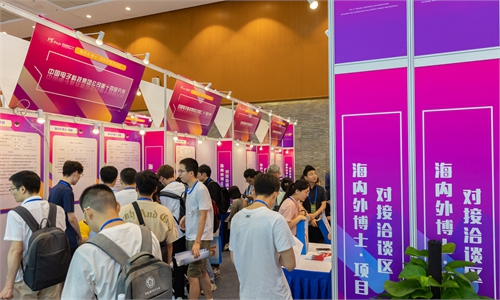
A job fair at the first Three Gorges Talent Festival in Southwest China's Chongqing Municipality attracts many job-seekers, on May 14, 2023. Photo: VCG
China's Ministry of Human Resources and Social Security will launch a four-month nationwide campaign in counties and cities from September to December to boost entrepreneurship among fresh college graduates and young entrepreneurs by providing them with more resources and opportunities, according to a notice issued on the ministry's website on Tuesday.
The campaign aims to provide actual resources to young entrepreneurs in terms of venues, funds, operation and management, market expansion and talent support.
In July, China's National Bureau of Statistics revealed the unemployment rate in June for Chinese youth aged 16 and 24 had reached 21.3 percent. The bureau predicted a rising unemployment rate for youth in July, but expected the figure to drop in August.
During a press briefing in late July following the release of the statistics, the Ministry of Human Resources and Social Security vowed to make an all-out effort to promote employment and boost entrepreneurship among young people.
According to the ministry, entrepreneurship incubation bases will be organized to develop venue resources that meet the needs of entrepreneurs.
Besides this, a series of financing events to expand channels that connect investment and financing services and entrepreneurs will be held for entrepreneurial projects.
Meanwhile, training on entrepreneurship will be organized to provide young entrepreneurs with more practical experience for starting a business.
Other services to boost entrepreneurship among young Chinese include holding lectures on entrepreneurship, providing talent recruitment services and implementing subsidy and loan policies for startups.
Apart from starting new businesses, a new trend in recent years has seen more Chinese college graduates return to their less-developed hometowns after graduation since finding a job in big cities has become more difficult due to the impact of the COVID-19.
Research conducted by MyCOS, an education consulting and research institute in Beijing, shows that college graduates born in the late 1990s and 2000s are more rational and practical when it comes to their attitudes and opinions toward employment.
More fresh college graduates choose to find a job back in their hometown cities rather than in Beijing, Shanghai, Guangzhou or Shenzhen.
According to the MyCOS research report, the proportion of fresh college graduates returning to their hometowns for employment has increased from 43 percent in 2018 to 47 percent in 2022, a significant increase of 4 percentage points over the past five years, which reflects the increasing willingness of college graduates to return home for employment.
The research report also shows the willingness of graduates to head home for employment may be closely related to the level of regional economic development. Statistics show that the proportion of graduates seeking jobs in their hometowns is the highest in the eastern regions at 59 percent, while the northeastern regions have a relatively lower proportion of only 24 percent.
Staying in first-tier cities or not is a decision made by college graduates based on practical reasoning and the employment environment and it has also been a hotly discussed topic over the past few years, Xiong Bingqi, director of the 21st Century Education Research Institute in Beijing, told the Global Times on Tuesday.
The key point of attracting young people to their hometowns for employment and business is the prospect of developing the talent environment in places where they can truly settle down. Otherwise, they would still return to big cities if they find the space for career development was limited in smaller cities, Xiong noted.



